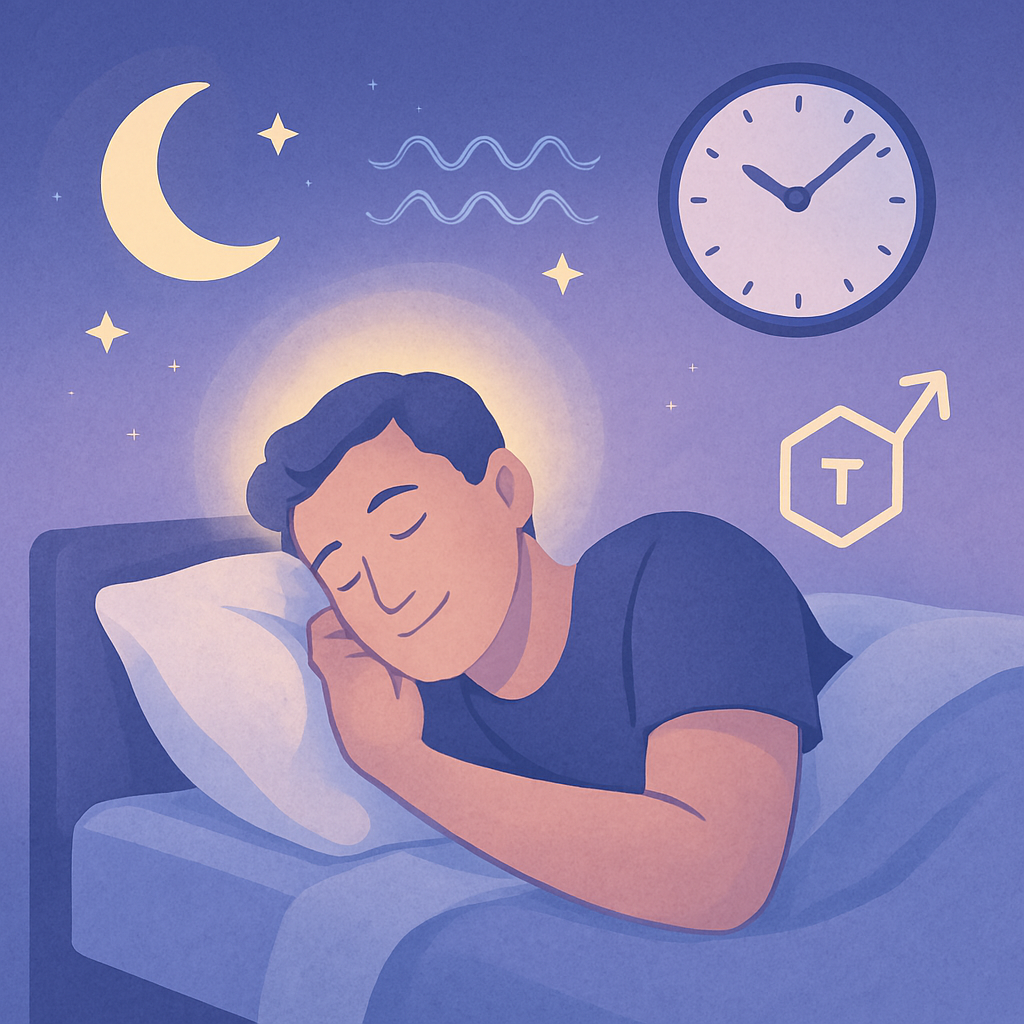A Surprising but Critical Connection
When it comes to erectile dysfunction (ED), most men focus on diet, exercise, hormones, or stress. But one of the most overlooked factors in sexual performance is sleep. Without proper rest, the body can’t produce the hormones, maintain the blood flow, or regulate the nervous system required for healthy erections. In fact, poor sleep is one of the fastest ways to disrupt testosterone levels, increase stress, and impair sexual function — often without men realizing it. Understanding how sleep impacts erections can help you improve your performance both in and out of the bedroom.
What Happens During Sleep That Affects Erections
Sleep is when the body recovers, repairs, and balances hormones. It’s also when the brain consolidates emotions, clears stress, and regenerates nerve function. One of the most interesting sleep-related phenomena in men is nocturnal penile tumescence — commonly known as “morning wood.” These spontaneous nighttime erections are a sign of healthy blood flow and sexual function. If you stop experiencing them, it can be a red flag that your sleep quality or hormone levels are off.
The Role of Testosterone
Testosterone is the key hormone behind libido, arousal, and erectile strength. It’s primarily produced during deep sleep, especially during REM (rapid eye movement) cycles. When sleep is cut short or disrupted, testosterone production drops significantly. Studies show that men who sleep fewer than 5 hours per night for just one week can experience up to a 15% drop in testosterone levels. Chronic sleep deprivation only worsens this effect over time.
How Poor Sleep Leads to ED
- Reduced testosterone lowers libido and weakens erections
- Increased cortisol (the stress hormone) disrupts nitric oxide production and raises blood pressure
- Nerve fatigue reduces arousal and sensitivity
- Weight gain and insulin resistance from poor sleep further harm circulation and hormone balance
- Mood swings and depression from lack of rest interfere with desire and emotional connection
If you’re getting poor sleep, your body is in a state of stress — not readiness — and that affects your ability to respond sexually.
Sleep Disorders Linked to Erectile Dysfunction
Sleep Apnea
Sleep apnea is one of the most common sleep-related causes of ED. This condition causes repeated pauses in breathing during the night, reducing oxygen supply to the brain and body. It disrupts deep sleep and REM cycles — the very stages critical for testosterone production and recovery. Symptoms include loud snoring, choking during sleep, and excessive daytime fatigue. Men with untreated sleep apnea are more likely to suffer from ED.
Insomnia
Insomnia — the inability to fall asleep or stay asleep — leads to chronic fatigue, hormonal imbalances, and increased anxiety, all of which contribute to sexual dysfunction.
Restless Leg Syndrome and Fragmented Sleep
Conditions that interrupt sleep or reduce its quality can also negatively affect erectile function, even if total sleep time seems sufficient.
Signs That Sleep May Be Causing Your ED
- You wake up tired even after a full night in bed
- You no longer get morning erections
- You experience increased irritability, brain fog, or low mood
- You rely on caffeine or stimulants to get through the day
- Your sex drive has dropped without clear reason
If these symptoms are present alongside ED, sleep may be a hidden culprit.
How to Improve Sleep for Better Erections
1. Set a Consistent Sleep Schedule
Go to bed and wake up at the same time every day — even on weekends. This trains your body to enter deep sleep more easily and maintain healthy hormone rhythms.
2. Create a Sleep-Friendly Environment
Keep your bedroom cool, dark, and quiet. Avoid screens at least an hour before bed, as blue light suppresses melatonin — the hormone that regulates sleep.
3. Avoid Heavy Meals and Alcohol Late at Night
Large meals, alcohol, and caffeine before bed disrupt sleep quality and increase nighttime awakenings, which interfere with hormone production and recovery.
4. Reduce Stress Before Bed
Establish a calming nighttime routine that includes stretching, deep breathing, meditation, or light reading. Avoid checking email or scrolling through social media.
5. Get Evaluated for Sleep Apnea
If you snore loudly, feel tired during the day, or wake up gasping, consult a doctor. Sleep apnea is treatable, and proper treatment (like using a CPAP machine) often leads to significant improvement in both sleep and sexual performance.
The Power of Naps
While naps don’t replace night-time sleep, a 20–30 minute nap during the day can reduce fatigue and help balance cortisol. However, avoid napping too late in the day, as it may interfere with your ability to fall asleep at night.
When to Seek Professional Help
If you’ve made changes to your sleep habits and still struggle with fatigue, mood issues, or ED, it’s time to talk to a healthcare provider. Blood tests for testosterone and screening for sleep disorders can reveal deeper causes that may need medical support.
Rest Your Way to Better Performance
Sleep isn’t a luxury — it’s a necessity for sexual health. While many men look for quick fixes to improve erections, the most effective strategy may be as simple as going to bed earlier. By prioritizing deep, consistent, restorative sleep, you give your body the chance to recover, balance hormones, and restore blood flow — all critical for strong, lasting erections and overall vitality.
